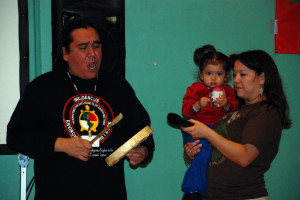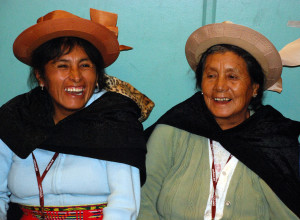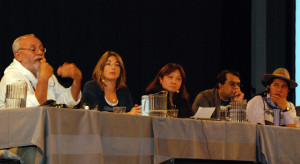Here at COP-10, the negotiations of the UN Convention on Biological Diversity in Nagoya, Japan, there have been several areas that have been strongly controversial. Among these: geoengineering schemes, the rights of Indigenous Peoples, and the infiltration of business and the markets into the negotiations. Today, instead of sharing my own ideas on these topics, I include writings by others. Warning: some of the language may be wonky, read at your own risk.
–Anne Petermann, Executive Director, Global Justice Ecology Project and North American Focal Point, Global Forest Coalition
Source: CBD Alliance ECO newsletters: http://www.cbdalliance.org/cop-10/
- Tom Goldtooth, Executive Director of Indigenous Environmental Network explains the importance of Indigenous Peoples traditional knowledge in protection of biological diversity at an event featuring “13 Grandmothers” on October 19th in Nagoya, Japan. Photo: Petermann/GJEP-GFC
Indigenous Representatives Denounce Canada’s Obstructionist Position at COP10
Adapted from IIFB Press Statement
Canada stands alone in its shameful opposition to preambular text “Taking into account the significance of the United Nations Declaration on the Rights of Indigenous Peoples” (UNDRIP) in the proposed ABS (Access and Benefit Sharing) Protocol. Reminding parties that it did not endorse the UNDRIP, Canada insisted that the reference to the UNDRIP be both bracketed and deleted. Indigenous Peoples insist the ABS Protocol must take into account the significance of the UNDRIP.
Armand MacKenzie, Executive-Director of the Innu Council of Nitassinan (Innu Nation), stated that, “You cannot claim to be a champion of human rights on the one hand and at the same time oppose the most widely accepted international charter in relation to Indigenous Peoples’ rights. With such strong arm tactics undermining Indigenous Peoples’ human rights, it is no wonder Canada lost their bid for a seat on the UN Security Council.”
“Canada has contradicted its speech from the throne when it stated it would take steps to endorse the UNDRIP. The apology from the Prime Minister of Canada for the Residential School system was a positive move towards reconciliation between Canada and Aboriginal Peoples. This obstructionist position is an enormous step backwards, is unacceptable and undermines all Indigenous Peoples’ collective rights” states Ellen Gabriel, president of Quebec Native Women.
“The Canadian government has been undermining the human rights of the world`s Indigenous Peoples since 2006, both at home and internationally”, emphasized Paul Joffe, lawyer representing the Grand Council of the Crees (Eeyou Istchee). “Such conduct severely tarnishes Canada`s reputation globally and puts in serious doubt Canada’s stated intention to endorse the UNDRIP is in good faith.”
Background on Indigenous Issues at the UN CBD
Indigenous delegates from every region of the world have come to Nagoya to be heard at the COP10 negotiations. Indigenous Peoples continue to be among the most marginalized, discriminated and exploited peoples despite living in some of the worlds most biodiverse regions.
Indigenous delegates under the umbrella of the International Indigenous Forum for Biodiversity (IIFB) have been deliberating and working out strategies for negotiating at the COP 10 during the past three days of preparatory meetings.
The IIFB is a collection of representatives from indigenous communities and governments, indigenous non-governmental organizations, indigenous scholars and activists who organize around the Convention on Biological Diversity (CBD) and other important international environmental meetings to help coordinate indigenous strategies at these meetings, provide consultation to the government parties, and influence the interpretations of government obligations to recognize and respect indigenous rights to the knowledge and resources.
The IIFB was officially acknowledged to be a formal advisory body to the CBD in COP5 in Nairobi, a step that has enhanced the presence and voices of indigenous peoples in the CBD and related processes. Since this groundbreaking step at COP5, subsequent COPs of the CBD have seen active and effective work by Indigenous peoples and indigenous organizations, as have a range of sub-processes regarding the implementation of Article 8(j), Access and Benefit Sharing, and others. This participation of Indigenous Peoples in this international process is often not reflected at the national level.
In this time the status of Indigenous Peoples has been recognized with the passing of the United Nations Declaration on the Rights of Indigenous Peoples (UNDRIP) by United Nations General Assembly in September 2007, the impact of this has yet to be fully realized within the context of the CBD. In addition, in some countries there are still many Indigenous Peoples who are still struggling for their rights, and demanding for their recognition as Indigenous Peoples.
This Declaration affirms the existence and establishment of the universal human rights standards for the protection of the rights of Indigenous Peoples. Implementation of decisions under the Convention on Biological Diversity must be consistent with the rights enshrined in this Declaration.
For more information please see: http://iifb.indigenousportal.com
———————————
First Global Discussion on Geoengineering Kicks Off
Paragraph 8(w) may be only the beginning
by ETC Group
One of the hottest issues under Climate Change and Biodiversity [at COP-10] has proven to be paragraph 8 (w), which arrived … in bracketed form:
[(w) Ensure, in line and consistent with decision IX/16 C, on ocean fertilization and biodiversity and climate change, and in accordance with the precautionary approach, that no climate-related geoengineering activities take place until there is an adequate scientific basis on which to justify such activities and appropriate consideration of the associated risks for the environment and biodiversity and associated social, economic and cultural impacts;]
COP10 is the first UN inter-governmental negotiating forum that is openly debating the issue and that is prepared to take a decision on geoengineering as a whole. Not surprisingly, there are different opinions about what the term “geoengineering” entails. This debate exists outside the CBD as well. The issue of scope is central, but should not be difficult to resolve.
What is really at stake in this debate?
Whether or not the precautionary principle will be applied to high-risk and large-scale interventions in the climate system lies at the heart of the debate. Deletion of paragraph 8(w), as proposed by some delegations, would send the wrong signal to those states and private entities that want to engineer the climate by manipulating the very ecosystems the CBD was designed to protect.
Will this decision prevent research and discussion? Geoengineering proponents claim that the proposed wording of the moratorium could prevent people from talking about geoengineering, undertaking research and computer modeling. Such claims are ludicrous. The word “activities” may indeed be broad, but that is the same wording that was applied to ocean fertilization in 2008 and the two subsequent years saw vigorous debate in scientific, political and civil society circles, as well as continued lab research and modeling. The result: ocean fertilization is increasingly discredited as an effective response to climate change and the prospects for making money off ocean fertilization carbon credits is now rightly remote. This is good news for oceans and the people who depend upon them for their livelihoods.
Will this decision prevent companies from developing geoengineering schemes?
It will not prevent research, but it should prevent commercialization. If geoengineering is an “emergency response” then it cannot be handed over to private entities whose primary goal is to make money!
Nevertheless, all kinds of patents on these technologies have been awarded or are awaiting approval. The 2008 decision on ocean fertilization explicitly prohibited research that was “used for generating and selling carbon offsets or any other commercial purposes”. The same should be made clear in this decision about geoengineering as well.
Why are some countries opposing 8(w)?
Some countries are anxious to move forward with geoengineering – not only with research in computer modeling and laboratories, but in the real world. Thus far, only Russia has experimented with Solar Radiation Management techniques but a small group of geoengineers in Canada, the UK and the US (amongst others) is also anxious to move forward with such tests. They want to experiment with cloud whitening, altering the alkalinity of our oceans and more. We know that altering the sun’s radiation will affect precipitation patterns, potentially threatening the food supplies of up to 2 billion people. (1)
Such experiments cannot be allowed to proceed in the absence of inter-governmental consensus and oversight and a careful consideration of the intended and unintended impacts. However, no such information or even a risk assessment to do so exist now. Rushing ahead with climate engineering interventions could be disastrous.
What happens next if the moratorium is agreed to?
The debate will continue, with a much diminished risk of a unilateral intervention that could go badly wrong and with assurance that any attempt to engineer the climate would be quickly condemned by the international community. The moratorium will buy the world – both governments and civil society – the time we need to debate whether or not this is the road we want to go down and how to put in place meaningful risk assessments and controls. The debate on geoengineering will not be over. It will be safer.
ETC Group’s new report: Geopiracy: The Case Against Geoengineering was published this week and is available with other background documents on our website (www.etcgroup.org).
(1) See Alan Robock, Martin Bunzl, Ben Kravitz, Georgiy L. Stenchikov, “A Test for Geoengineering?” Science, 29 January 2010, Vol. 327. no. 5965, pp. 530-31 and ETC Group news release, “Top-down Planet Hackers Call for Bottom-up Governance,” 11 February 2010 available at http://www.etcgroup.org/en/node/5073.
——————————-
It’s About Life and Life is Not a Business
by Susan Walsh, USC – Canada and Bernrd Beermann
When members of the public in the UK were asked in a recent survey what the word biodiversity meant, the most common answer was “some kind of washing powder”. In response, Kate Rawles of the University of Cumbria states: “Modern societies … are dangerously close to completely losing touch with the value of other living things”.
The 193 Parties and hundreds of civil society organizations gathered at the 10th Conference of the Parties to the United Nations Convention on Biological Diversity do know what biodiversity means. They understand only too well what is at stake if the dramatic erosion of our planet’s biological diversity is not stopped in its tracks, as well as the corresponding loss of resilience that could lead us all over the brink into a world where we are no longer welcome. Within the past century, for example, we have lost an estimated 75% of our plant genetic resources and, over the past decade alone, nearly 60 million hectares of primary forest. We are driving species to extinction at up to 1000 times the natural rate. How will the 1 billion people who depend on fish as their sole or main source of animal protein survive if 80% of examined world marine stocks are exploited or overexploited?
The Japanese Times’ special editions on COP 10 put it this way: “In Nagoya, the issue under discussion is not melting glaciers or brutally hot summers that extend long into autumn due to global warming, but life itself.”
The challenge is daunting. We face compounding environmental, food, fuel, economic, and climate crises that are converging into a perfect storm of biodiversity loss and social injustice. The conservation, sustainable use, and equitable sharing of benefits of biodiversity are fundamental to addressing these crises. Time and again, however, we see governments agreeing to business as usual, downplaying overconsumption, and searching for newer and better technological solutions with short-term, often counter-productive results. Governments can and must do better. We call on parties to strengthen the Convention’s core principles, particularly the ecosystem approach, the precautionary principle, participation, equity, justice, and an understanding that biodiversity cannot be separated from those humans with values that nurture, defend and sustainably use biodiversity.
We are particularly troubled by trends such as the growing popularity of market mechanisms that carve nature into pieces of valued and not so valued property and the growing influence of corporate actors who place profit ahead of the integrity of human community and the landscapes we inhabit. The convergence of the Rio Conventions must be preceded by clear evidence that the CBD’s values and principles will not be lost in the mix.
Unchecked, these trends could well undermine our largest ecosystem – the planet. The commodification of nature is at the heart of biodiversity loss and eroded resilience. The spirit of collaboration in Nagoya must reflect a willingness to respect nature’s gifts and complexities.
Civil society organizations here in Nagoya call on the delegates and their capitals to reconnect with Mother Nature and with the multiple values of other living things. If we are to avoid that perfect storm from blasting its way through our ever-fragile planet, we need to tap into that kinder, gentler human in us all.












